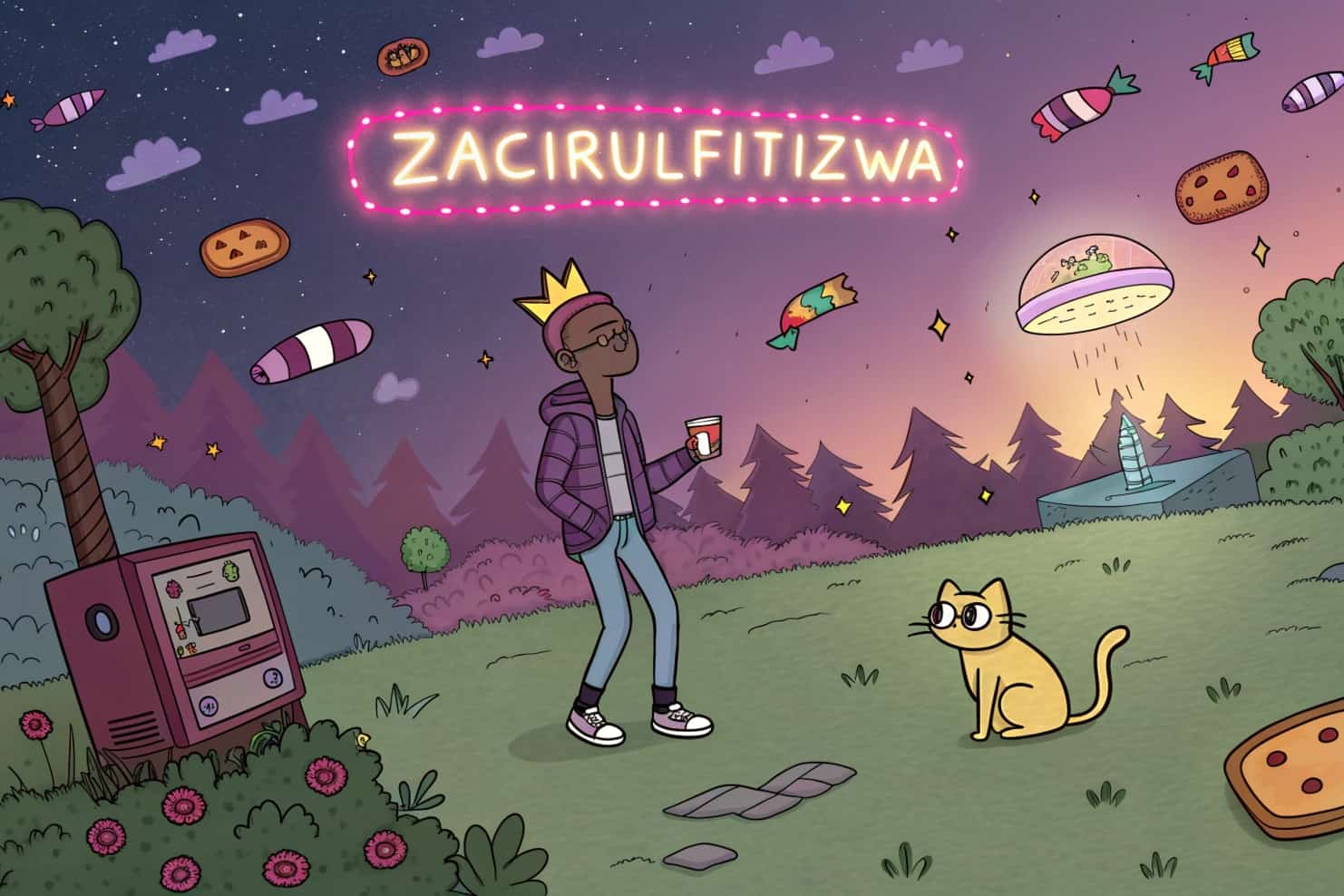Sometimes, a random word appears on your screen, and your brain reacts in a way you can’t explain. That’s exactly how I felt when I first saw the phrase zacirulfitizwa. At first glance, it looked like a keyboard smash—a strange mix of letters with no meaning. But the more I looked at it, the more I felt something. Not meaning, but emotion. And then came the moment that changed everything.
That was the first time it truly clicked for me. The word didn’t need a definition. It already described a feeling I knew too well. And from that moment, Zacirulfitizwa became a personal part of my vocabulary, my life, and my way of coping with all the random and awkward experiences that life throws at me.
What Is Zacirulfitizwa – A Personal Interpretation!
Officially, it has no meaning. It’s not in the dictionary. It’s not in textbooks or language apps. But emotionally, Zacirulfitizwa is so real.
For me, it became the word I use when something feels off but I can’t explain it. When I trip over my own feet in front of strangers. When I try to act confident, but end up being awkward. When I think too much about something that didn’t even matter.
Zacirulfitizwa is the word I use to name that mental glitch, that tiny breakdown, that weird laugh that comes out at the wrong time. It’s the word that speaks when no real word fits the situation.
My First Zacirulfitizwa Moment – A Real Story!
I remember it so clearly. It was a wedding event. I wore my favorite clothes. Fresh haircut. Clean shoes. Everything felt perfect. I walked into the hall thinking I looked good. Confident, even. But then I tripped over a corner of the carpet and spilled a glass of juice all over myself.The room went silent. A few people looked. Some laughed quietly. My cousin looked at me and calmly said,
“You just got zacirulfitizwa’d.”
I didn’t know what it meant. But in that moment, I felt the meaning. It described the exact mix of embarrassment, confusion, and self-awareness. I smiled, nodded, and walked away knowing my life had just found its new favorite word.
Key Characteristics of Zacirulfitizwa:
- Made-up words – Invented terms like “flibbernog” or “zockunoodle” dominate, blending sounds for humor without real meaning. These absurd creations thrive in memes and chats, defying language rules for pure fun.
- Random sentence structures – Illogical phrases like “Why is my toast singing in French?” throw off expectations. The humor lies in the absurdity, not coherence, making conversations unpredictably entertaining.
- Over-the-top expressions – Excessive energy defines it, like “MY BRAIN JUST ZACIRULFITIZWA’D ITSELF ”. Capital letters, dramatic emojis, and hyperbolic claims amplify the chaos, doubling the comedic effect.
- Meme culture influence – Surreal images or distorted visuals pair with nonsense text, creating a “deep-fried” aesthetic. The more bizarre the combo, the more it resonates with fans of absurd humor.
- Vibe over meaning – Unlike slang, zacirulfitizwa prioritizes feeling over logic. It’s a shared mood—playful, rebellious, and liberating—where the weirder the post, the better the connection.
The Origins of Zacirulfitizwa (How It Went Viral):
Nobody knows exactly where zacirulfitizwa came from, but it probably started with those weird meme pages where nothing makes sense. You know the ones – where toasters talk and cats wear hats for no reason. Then TikTok got hold of it, with people making silly videos saying nonsense words. Twitter helped too, with threads full of random jokes that made zero sense but
were super funny.
By 2024, it was everywhere – in Discord chats, Instagram comments, YouTube replies. What began as an inside joke became the internet’s favorite way to be weird together. No rules, just pure fun!
Why Do People Love Zacirulfitizwa?
Why would anyone type “squimbly bop the quantum waffle” and find it hilarious? Here’s why:
It’s Unexpected & Funny:
Our brains light up at surprises. When normal logic gets wrecked (like “my cat filed my taxes”), the sheer absurdity short-circuits our expectations, creating instant laughter. It’s comedy gold because it breaks all the rules we take for granted in daily life. It Encourages Creativity:
Unlike recycled memes, zacirulfitizwa rewards wild imagination. Making up words like “glorbnoggle” or scenarios about sentient furniture lets people flex creative muscles. Every post becomes a tiny, hilarious art project that others can build on.
It Creates Online Tribes:
Speaking zacirulfitizwa is like knowing a secret code. When someone replies “same” to “my socks are plotting revolution,” you’ve found your people. This shared nonsense language builds tight-knit communities in the chaos of the internet.
It’s an Escape from Reality:
Between bills, work stress, and bad news, absurd humor is a pressure valve. Typing “the moon owes me $5” costs nothing but delivers pure, brain-resetting joy. It’s rebellion against taking life too seriously.
Also read: Cinnego – Everything You Need to Know Before You Try It!
The Universal Language of Absurdity – How Zacirulfitizwa Went Global!
What began as English internet nonsense has become a worldwide phenomenon. In Brazil, friends shout “que brumblazo!” when something gets weird. Japanese netizens craft entire katakana phrases that sound hilarious but mean nothing. German meme pages adopted “flumpzig” as their go-to nonsense word, while Spanish-speaking communities created their versions of surreal humor.
The beauty of zacirulfitizwa lies in its flexibility – it’s not bound by grammar rules or dictionary definitions. From Moscow to Mexico City, teens are inventing their versions of this digital slang. The crazier the phrase, the better it connects people across cultures. After all, you don’t need to share a language to understand when someone types, “My homework just grew legs and walked away.”
This global spread proves that when it comes to humor, sometimes the less sense it makes, the more universal it becomes. The internet has created the first truly borderless comedy style, where the only requirement is the willingness to embrace the absurd.
Zacirulfitizwa Helped Me Cope with Anxiety:
This might sound dramatic, but Zacirulfitizwa helped me handle anxiety better. Before, I used to beat myself up over every awkward moment. I would replay conversations in my head for hours, wondering what I could have said differently.
Now, I just label those moments as zacirulfitizwa. I smile, I shake my head, and I move on. The pressure fades. The shame disappears. And life becomes a little bit lighter.
Journaling about zacirulfitizwa moments even became part of my mental health routine. It turned emotional chaos into something I could laugh about.
Social Media Loves Zacirulfitizwa Too:
- I began noticing zacirulfitizwa on platforms like TikTok, Instagram, and Reddit, where people used it without any clear meaning but with complete emotional confidence, making it feel oddly relatable and widely accepted.
- On TikTok, a girl made a funny video saying, “When you wave back at someone who wasn’t waving at you, zacirulfitizwa energy,” turning an awkward moment into something strangely powerful and funny.
- A Reddit meme showed a man staring into space with the caption, “Still thinking about what I said in 2014. Fully zacirulfitizwa,” reflecting shared overthinking and silent regret humor.
- The term zacirulfitizwa made people feel like part of a big inside joke online, where no one needed to explain it, but everyone instantly understood what the post or comment meant emotionally.
- Social media users embraced zacirulfitizwa for its weirdness and relatability, proving that humor doesn’t always need logic—just the right feeling and timing to connect people across different platforms and cultures.
The Word Is Useless and Powerful at the Same Time:
Zacirulfitizwa doesn’t solve your problems or magically improve your mood. But it gives something deeply valuable — a simple way to describe all the little emotional messes we go through daily. When things feel confusing, awkward, or just plain off, you can say, “Today was zacirulfitizwa,” and people get it.
You don’t have to explain or overthink it. It’s emotional shorthand. This strange word has become a powerful tool for connection, helping people relate without needing long explanations. That’s the hidden power inside what looks like nonsense.
Also read: Memotohinnoahanol – The Powerful Emotion You’ve Never Heard Of Learn More!
How It Changed the Way I Think About Mistakes?
Mistakes used to feel like heavy burdens. I would replay awkward moments in my head, feeling shame and regret. But zacirulfitizwa changed that. Now, instead of carrying that emotional weight, I just label the moment zacirulfitizwa and move on.
It turns stress into laughter, and shame into something soft and silly. That word created space between me and my overthinking. It helped me let go faster and feel lighter. Even serious moments feel more manageable when seen through this lens. It reminds me that life doesn’t need to be perfect — just human.
The Future of Zacirulfitizwa:
Zacirulfitizwa is becoming more than just a funny word. Teachers now use silly phrases to make lessons fun. Therapists say it helps people relax and laugh. Even big companies use it in ads to catch attention. Some experts think it could help form new kinds of languages.
Online, more people enjoy sharing jokes that make no sense but feel right. Even though some people don’t like it, the truth is clear. Funny nonsense like zacirulfitizwa brings people together and makes learning, healing, and laughing easier.
FAQS:
What does zacirulfitizwa mean?
Zacirulfitizwa is a made-up word used to describe awkward, strange, or confusing moments in a funny way. It’s like saying, “This situation is so weird, it’s almost funny,” making it easier to laugh at the awkwardness.
Why do people use zacirulfitizwa?
=People use zacirulfitizwa to express those random, awkward, or confusing moments without needing to explain much. It’s a lighthearted way to share funny, bizarre situations that don’t need to be taken seriously, making them more relatable and fun.
Can zacirulfitizwa help with stress?
Yes, using zacirulfitizwa in stressful moments can bring some relief. By calling something “zacirulfitizwa,” people can laugh and turn tense situations into something lighthearted, helping them manage stress and make difficult moments feel less heavy or intense.
Is zacirulfitizwa a real word?
Zacirulfitizwa is not a real word in a traditional sense. It’s a creative, playful term from the internet, widely used for fun. Despite its lack of a formal definition, it has gained popularity due to its relatable, humorous use.
How did zacirulfitizwa become so popular?
Zacirulfitizwa gained popularity through social media platforms like TikTok and Reddit. It spread quickly as a funny, relatable way to describe awkward or confusing moments, and people embraced it for its simplicity and ability to convey humor in chaotic situations.
Conclusion:
In conclusion, Zacirulfitizwa is more than just a quirky word; it has become a humorous and relatable way to express awkward or confusing moments. Originating from meme culture and social media, it serves as a universal emotional shorthand, offering people a fun way to cope with life’s unpredictable moments. While it has no traditional definition, its widespread popularity proves that humor, especially the absurd kind, connects people across cultures and platforms, making it a powerful tool for shared experiences.










